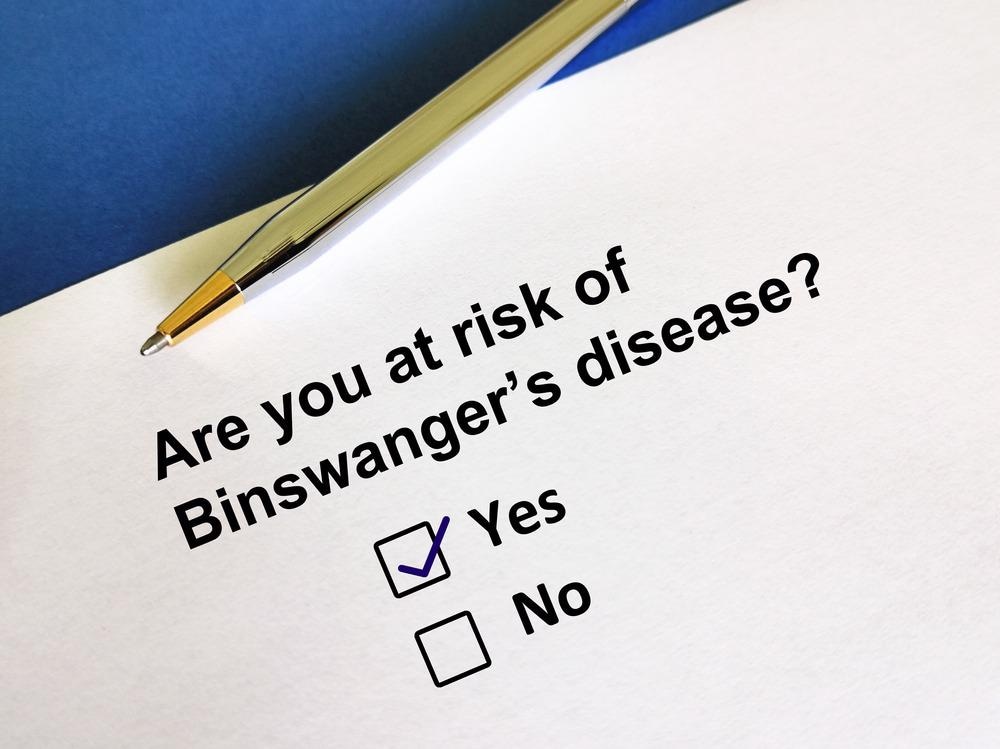Binswanger disease, also known as Binswanger encephalopathy and subcortical dementia is a progressive neurological condition. It is a kind of vascular leukoencephalopathy that can cause cognitive impairment and neurological abnormalities. Diagnosing the disease can be challenging. Arteriosclerosis and thromboembolism can cause the disease by impairing the blood arteries that supply the brain's white matter and deep structures (basal ganglia and thalamus).
Over a five to ten year period, most patients have a gradual loss of memory and intellectual ability (dementia), urine urgency or incontinence, and an abnormally slow, shuffling, unstable walking pattern. While there is no cure for Binswanger's disease, it can be slowed by adopting a healthy lifestyle. Treatment is based on the signs and symptoms that each individual exhibits.

Image Credit: Yeexin Richelle/Shutterstock.com
Causes and symptoms
Arteriosclerosis, thromboembolism, and other illnesses that restrict blood arteries responsible for nourishing the deep regions of the brain produce Binswanger disease. Hypertension, hypercholesterolemia, cardiac disease, sleep apnoea, atrial fibrillation, diabetes mellitus, and smoking are some of the major risk factors.
It can also be caused by rare genetic diseases like CADASIL (cerebral autosomal dominant arteriopathy with subcortical infarcts and leukoencephalopathy). Binswanger disease, therefore, is a clinical syndrome of vascular dementia caused by a variety of factors rather than a single disease.
The way the clinical elements of the disease advance, with the stepwise or gradual growth of cognitive impairment and other neurological signs and symptoms, is an important factor. The first signs of Alzheimer's disease usually occur between the fifth and seventh decade of life. The illness's clinical course is unpredictable and can last anywhere from five to ten years. Dementia and a dysexecutive syndrome (changes in attentional control, working memory, and short-term memory, impulse control, and abulia in the final stages) are two conditions that cause cognitive and behavioral abnormalities.
Affected people are frequently inactive, apathetic (uncaring), depressed, and unable to act or make decisions (abulic). They withdraw, show poor judgment, lack planning, and organizing skills, and communicate less spontaneously. Affected people may also have trouble speaking (dysarthria), swallowing (dysphagia), and controlling their urine bladder (incontinence).
Slowness, poor balance, and short, shuffling steps are noticed in some patients, which are similar to those found in Parkinson's disease (Parkinsonism). Tremor is not a common symptom. Many people with Binswanger disease have had strokes or transient ischemic episodes in the past. In contrast to the insidious, steadily progressing course of neurodegenerative illnesses, the symptoms and signs of this condition develop in a stuttering or stepwise pattern.
Epidemiology
Binswanger disease affects both men and women in equal numbers, and it mainly affects people over the age of 50. The thickening and narrowing of the arteries that supply the subcortical parts of the brain (atherosclerosis) usually begin in the fourth decade of life and gets worse with age.
Co-existence with Alzheimer’s disease
It is typical to have a combination type of dementia (Alzheimer's with Binswanger). The occurrence of comorbidity arises from the fact that the prevalence of both illnesses rises with age.
Prognosis
Binswanger's disease patients have a bad long-term outlook (prognosis). Unfortunately, there is no cure for the ailment, which is classified as progressive because the symptoms tend to worsen over time. Changes can be abrupt or gradual, and they can progress in stages.
Alzheimer's disease and Binswanger disease frequently coexist. It can be slowed by the same behaviors and lifestyle choices that delay the advancement of high blood pressure, diabetes, and atherosclerosis. It includes eating a nutritious diet, maintaining a regular wake/sleep schedule, exercising, and not smoking or drinking too much alcohol.
Diagnosis and treatment
The presence of characteristic signs and symptoms often leads to a diagnosis of Binswanger's disease. The diagnosis can then be confirmed with additional tests. A thorough clinical evaluation, including detailed patient history, physical examination, and magnetic resonance imaging (MRI) or computerized tomography (CT) scanning of the brain, is commonly used to diagnose Binswanger's illness. In the deep structures of the brain, MRI and CT scans demonstrate nerve fiber (white matter) deterioration and many minor strokes.
Because the ischemic brain damage in Binswanger disease is irreversible, treatment focuses on lowering stroke risk factors and thereby slowing the disease's course. Antihypertensive medicines to control blood pressure, antiplatelet drugs (e.g., aspirin) or warfarin to prevent thromboembolism, statins to prevent atherosclerosis, smoking cessation, and diabetes management are all common treatments. Antidepressant medications are beneficial in the treatment of depression caused by Binswanger disease. Symptomatic and supportive treatment is the only other option.
Patients with Binswanger disease frequently experience balance issues as well as parkinsonian symptoms. Before beginning an exercise program, a thorough review of physical therapy and programming should be completed.
Physical therapy encourages patients to participate in physical activities while acknowledging their dangers and limitations, despite the lack of evidence that it is a beneficial treatment. Yoga and tai-chi are probably beneficial, but further research is needed.
Risperidone and olanzapine, for example, are atypical antipsychotic medications that can help people with agitation and disruptive behavior. Recent pharmacological trials with the medication memantine have indicated better cognition and behavioral stability. Successful hypertension and diabetes treatment can reduce the progression of atherosclerosis and, as a result, the advancement of Binswanger disease. Despite this, there are no specialized clinical studies focusing on Binswanger disease medicines, making treatment selection challenging for this group of patients. As there is no cure, the best treatment is to address risk factors such as hypertension, diabetes, and smoking early in adulthood.
References:
Further Reading
Last Updated: Mar 10, 2023